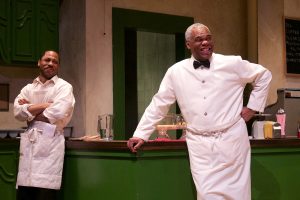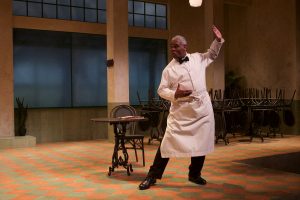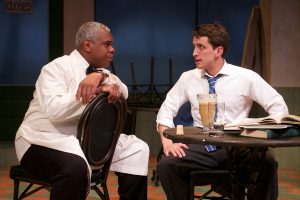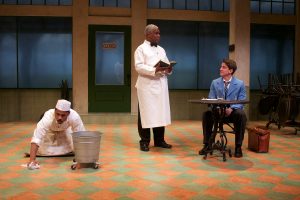This story features “‘Master Harold’…and the Boys” presented by Round House Theatre. Learn more about this performance and get tix.
It’s about racism and relationships, innocence and privilege, families and fatherhood, and the risky business of living life with optimism in the face of oppression. South African playwright Athol Fugard’s semi-autobiographical play “‘Master Harold’…and the Boys” moves between the art of ballroom dancing and the perils of parenting teenagers as it examines the impact of the state-sanctioned institutionalized racism known as apartheid. Actor Craig Wallace boils it all down to forgiveness. “‘Can you be the bigger man?’” he asked. “Do you have the capacity to forgive? It’s a huge question.”

The biggest question in the play, he added. Wallace calls it “a storytelling play, filled with reminiscences,” and it is that. But while, on its surface “‘Master Harold’…and the Boys” is about two middle-aged African servants and the 17-year-old son of their boss whiling away a rainy afternoon, it’s also a story from its author’s childhood. It’s a story remembered by Harold Athol Lanigan Fugard who, despite his lifetime work for social justice and his apartheid-defying career in theater, regretted the ways that bigotry and racism impacted his character and behavior as a young man. Initially banned from South Africa, “‘Master Harold’…and the Boys” mines the relationship between Sam (Wallace) and the white teenager Hally (Nick Fruit) —the “Master Harold” of the title—for a range of universal human truths.
“They could almost be father and son—until they’re not,” Wallace observed. “In the play, apartheid is outside the door, so within the play, we’re human beings. And every once in a while, throughout the play, apartheid comes in the door.”
Apartheid—the rigid, state-sanctioned segregation of the races with political and economic oppression for non-whites—was installed in South Africa in 1948, when the all-white National Party came to power. It forced the non-white South African majority to live separately from the white population, limiting contact between races. In Fugard’s play, it tests the limits of Sam’s nurturing father-figure-friendship with Hally. The play examines real-life problems like domestic violence and alcoholism, ruminates on the definitions of beauty and art, shows snippets of South African culture and history, and captures snippets of life that twist like funhouse mirror images when racism rears its head.
“That’s where we kind of are, right now,” Wallace observed. “The whole ‘Starbucks thing.’ Those two brothers went into Starbucks and were waiting for somebody; that manager decided those two brothers weren’t savory characters and called the police on them. That’s ‘Master Harold,’ right there.

“Even in the 21st century, we’re ‘all good’—until we’re not,” he added. “And then, what happens when we’re not? I live my life interacting with white people all the time, and in one of those interactions it could be ‘not right.’ What do I do when it’s not right?”
In the world of “’Master Harold’…” Sam’s “it’s not right” moment occurs with Nick Fruit, who plays Hally. Fruit, 23, described playing opposite Wallace as “absolutely amazing.
“It’s been like a second education for me,” said the actor, who earned a bachelor of fine arts degree in acting from Towson University. “To work alongside Craig Wallace and Ro Boddie—phenomenal actors!—and getting to work under (director) Ryan Rilette, I’ve just learned so much more.”
In his first big show in the D.C. area, Fruit said he “feels honored to share the stage with those two guys.” And while he wasn’t previously familiar with Fugard’s work, the Georgia native said that growing up in the American South meant “‘Master Harold’…and the Boys” resonated with his own experiences. “When I read the play, I was struck by it,” said Fruit. “I knew immediately I was doing a show that I connected very deeply with.”
Fruit pointed out that it took the playwright 30 years just to get the incident down on paper. “He was so ashamed of that moment, all of the things he said, all of the things he was unaware of. It was all so shameful for him—but he wouldn’t have been Fugard if that hadn’t happened to him. He wouldn’t have come to realize his own racism.”

From the very first day of rehearsals, Fruit said it was clear that the cast would need to be supportive of each other because of the open, vulnerable nature of their characters—and the sensitivity of the topics of racism and dysfunction. “We had to know each other’s boundaries,” he said. “After we leave the stage, we make sure we leave it all up there and we’re not dwelling in it. We have to bring ourselves out of it.”
The play, he said, “dips in and out of these moments of sheer joy and fun. And then there are these ‘record-scratch’ moments. Hally turns aggressive, as a 17-year-old boy would, but because of apartheid, his aggression takes on a racist form.”
On a personal level, he said, “I wouldn’t be able to do this play if it weren’t for the overall message. It takes me to a terrible place.”
A place where Wallace is ready. “I trust Nick,” he said. “And because I trust him, and because Ryan, our director, has created this room where we can go to the places we need to go to, I know that he’s safe.
“And he knows he’s safe. That’s the nature of acting. And we hug it out at the end, and it’s over. We’re putting it all out there on the stage for people to absorb it and respond.”

The audience gets pulled in, he added, embraced by the circle of the three actors onstage. “There are no huge light changes, no music; nothing’s coming up from the floor. It unfolds in real time, and what we appreciate is that people are gripped.”
Wallace said he doesn’t do plays “to be an advocate,” and that “‘Master Harold…” is no exception. “My biggest thing in doing this play was the message of forgiveness,” he said. “That was the thing that struck me, and that’s the challenge I put to the audience.
“Do you have the capacity to forgive? Do you have the capacity to understand, and to try and push forward to a new beginning?”
The next biggest thing? The play’s inescapable humor and humanity. “It’s funny—it’s fun,” said Wallace. “You’ll love seeing us together– until you don’t. And that’s kind of what life is; it goes back and forth.
“I present with all my heart, and with all the rehearsals we put in beforehand. And hopefully it reaches you, the audience, and moves you.”
“’Master Harold’… and the Boys” runs through May 6 at Round House Theatre, 4545 East-West Highway, Bethesda. Tickets start at $30, with discounts available for seniors, veterans, military and those younger than 30. Call 240-644-1100 or visit www.RoundHouseTheatre.org.